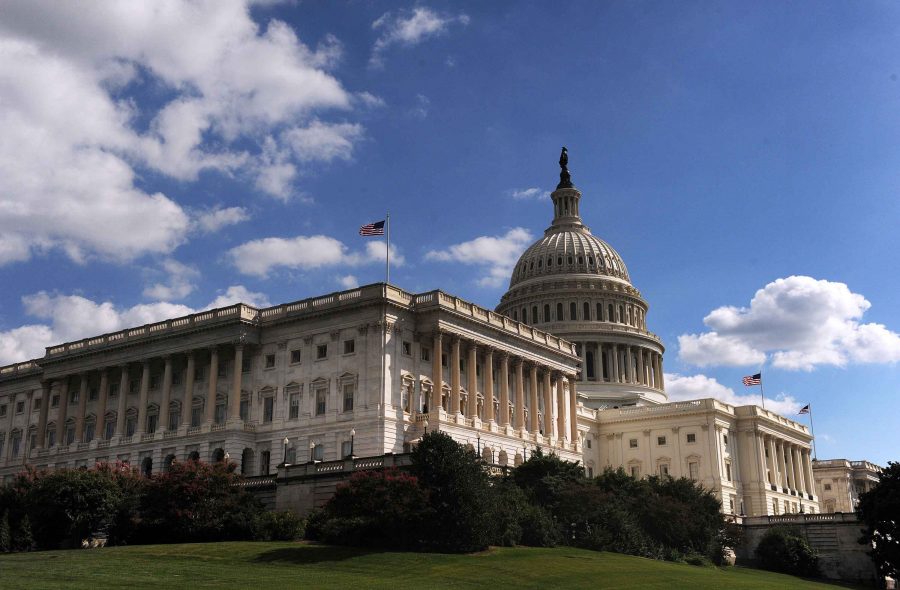Government funding and medical research to dominate lame-duck session
Hours before Tuesday’s deadline, Congress and the White House had yet to begin serious negotiations over next year’s budget, threatening a government shutdown that could delay Social Security payments, shutter national parks, museums and monuments and furlough hundreds of thousands of employees, Sept. 30, 2013. The Senate flatly rejected a House of Representatives proposal to keep the government funded through Dec. 15 but delay implementation of the contentious federal health care law. (Olivier Douliery/Abaca Press/MCT)
October 7, 2016
WASHINGTON — Last week, lawmakers raced to find a funding deal to avert a government shutdown, and they’ll be back in a few weeks to do it all over again.
Congress returns from the campaign trail on Nov. 14 for the so-called lame-duck session, which describes the period after the November election and before a new Congress takes effect in January. One of the few items likely to get done is funding the government through the 2017 fiscal year.
Leaders say that recently arduous negotiations over extending the funding deadline to Dec. 9 do not foreshadow tough spending talks during the lame-duck.
Advertisement
The Senate Appropriations Committee’s top Democrat, Barbara A. Mikulski, said she was eager to begin spending negotiations as soon as possible.
“Forging ahead!” the Maryland senator said, raising her fist as she sat in the subway car that runs between the Capitol and the Russell Senate Office Building after the final votes last week.
Senate Majority Leader Mitch McConnell and House Speaker Paul D. Ryan have both said they would like to pass small groups of appropriations bills, known as minibuses, rather than rolling all of the remaining bills into one package, known as an omnibus.
Ryan echoed House Appropriations Chairman Hal Rogers’ belief that members and staff would work through the six-week fall recess to get bills passed before the end of December.
House Minority Leader Nancy Pelosi said she had faith that Rogers, Appropriations ranking Democrat Nita Lowey and other members could work toward getting agreements on the remaining bills.
The California congresswoman said the passage of last week’s continuing resolution was an example of how appropriations bills can get bipartisan support if it doesn’t include poison pills.
“I have no doubt that left to their own devices, the appropriators can come to a conclusion on bipartisan legislation,” Pelosi said. “We’ll just see how that goes.”
Advertisement*
But it is not clear how many minibuses both chambers will be able to process in the four-week lame-duck session.
“We’ll just have to see what we can move,” McConnell said.
Spending fights will likely take up much of the time before the 114th Congress wraps up. But the GOP leaders in both chambers also expressed interest in passing a 21st Century Cures Act during the lame-duck. The measure is aimed at promoting medical research and developing innovative medical solutions.
The bill “could end up being the most significant piece of legislation we pass in the whole Congress,” McConnell said.
The majority leader said the broad health care bill and government spending would be the Senate’s top two priorities during the lame-duck.
Ryan, on the other hand, voiced ambitious expectations of what Congress could consider during the four-week session.
The Wisconsin Republican said one of his main focal points would be to take up legislation to overhaul the criminal justice system. Ryan said the House Judiciary Committee had reported out 11 bills on the matter. He downplayed potential opposition from some members because he said they didn’t know enough about the changes he aimed to make.
McConnell dashed some of Ryan’s hopes though, announcing in a news conference last week that the Senate is not likely to consider the measure.
“It’s very divisive in my conference,” McConnell said. “Whether we can take up something that controversial, with that amount of limited time available, I doubt.”
There were a couple of items that could come up in the lame-duck, which neither McConnell or Ryan mentioned in their wrap-up news conferences.
Bicameral talks on the National Defense Authorization Act are expected to finish, and the roughly $600 billion measure is expected to be completed during the lame-duck session, according to a Senate Armed Services Committee aide. The defense bill has been passed each year since 1961.
Lawmakers in both chambers are also in conference over an energy policy modernization bill. President Barack Obama threatened to veto the House version over provisions aimed at his climate change agenda, while the Senate version included more modest policy changes. Members and staff are working toward finishing the bill by the end of the year.
“We’re continuing to work on the bill and we’re moving in that direction,” said Nicole Daigle, a spokeswoman for the Senate Energy and Natural Resources Committee.
One issue McConnell is dead set against taking up in the lame-duck session is the confirmation of Obama’s Supreme Court nominee, Judge Merrick Garland.
Some Republicans have argued that Garland should be confirmed if Democratic presidential nominee Hillary Clinton wins the election, since she could nominate someone who is further to the left and younger than Garland. But McConnell, who controls the Senate floor, has stood firm in not taking up the nomination.
“As I’ve said repeatedly the next president will be filling that vacancy and we’ll have to see who that is,” McConnell said.
Democratic lawmakers will also be keeping close watch on negotiations over a water infrastructure bill during the lame duck. Leaders have assured Democrats that the final bill will include aid for Flint, Mich., which has been dealing with a water contamination crisis. A standoff over Flint aid threatened the fate of the continuing resolution at the end of September.
___
(c)2016 CQ-Roll Call, Inc., All Rights Reserved
Visit CQ Roll Call at www.rollcall.com
Distributed by Tribune Content Agency, LLC.
Advertisement









